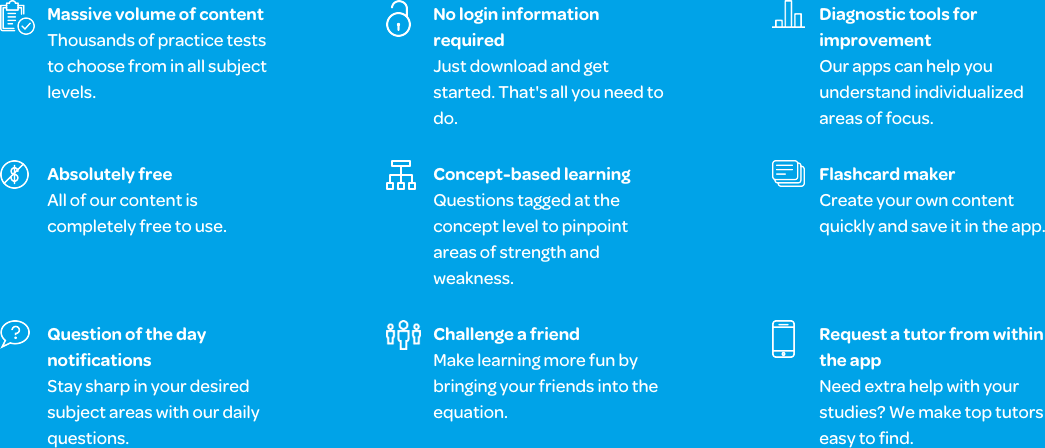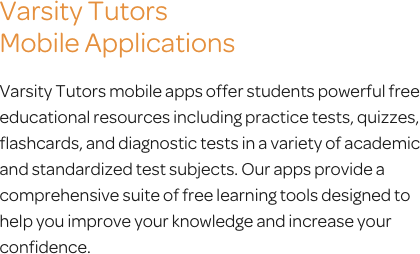The Varsity Tutors CLEP Humanities Mobile App
The College Level Examination Program (CLEP) Humanities exam can allow you to pass through college-level classes in music, literature, and art. These tests can save you money, as well as time, by allowing you to demonstrate that you have sufficient knowledge on the subject in question. When you pass, you can skip the introductory-level course in college and register for more advanced subjects in these areas.
The Varsity Tutors CLEP Humanities app is a free learning tool available from iTunes and the Google Play Store for both Android and Apple devices. The app uses a variety of professionally-written materials that reinforce and assess your knowledge. It can help you as you prepare for the 90-minute exam. You are given access to a plethora of free tools designed to enhance and streamline your study sessions. These tools cover every concept that you will be tested on during the exam using interactive options, such as full-length practice tests, concept-specific practice exams, flashcards, and the Learn by Concept tool.
The exam will assess your knowledge of literature and art. It covers a wide range of topics, such as drama, poetry, painting, sculpture, architecture, music, film, and dance. These topics are split into three basic categories: performing arts, literature, and visual arts. You must also have a broad knowledge within the main time periods covered by the Humanities exam, including Classical, Medieval and Renaissance, and the 17th through 20th centuries.
Flashcards have been used for decades to help students with their studies. On the app, you are given a question with four answers to choose from. Once you answer, the flashcard provides a detailed explanation of the concepts that apply to the question you were asked, even if you answered correctly. This is to ensure that you not only know how to solve the problem, but also know the reasoning behind the correct answer. Flashcards can be used for fast-paced study sessions, or as a pop quiz to test yourself on different concepts.
Take comprehensive full-length practice tests, or narrow your focus with a concept-specific practice test that analyzes the content of drama in literature or the identification of important figures in Baroque music. Each test you take in the app is saved using the Tests Taken feature, which allows you to track your progress and improvement. The full-length practice exams provide detailed feedback on scores by concept area, and they also offer explanations for questions you may have missed.
You can also work with the Question of the Day. This is a question that is changed on a daily basis and taken from the practice exams. There is a new question for every concept that you can study with the app, allowing you to practice with each category on a daily basis.
Available from iTunes and the Google Play Store, the Varsity Tutors CLEP Humanities app for iPhone, iPad, and Android is a convenient and easy-to-understand study tool for CLEP preparation. Whether you need to go over a concept quickly, or you need a full review of the concepts, you have the study materials necessary to enter your test with the confidence and skills needed to succeed.
66 mobile apps to choose from for your tutoring needs.

Learn More
If you are a high school student who is homeschooled, have completed a comprehensive independent study program, or have gained real-life work experience in a relevant area, the College Level Examination Program may be beneficial for you. If you have experience studying poetry, literature, and the arts, and you wish to study in a degree program where these academic areas are important, you should consider taking the CLEP Humanities test.
The CLEP Humanities test covers literature, visual arts, and performing arts from a variety of time periods. You will need to have knowledge of a number of great civilizations and how their art and culture influenced each other. To successfully prepare for the test, you should be familiar with a variety of culturally significant works of art, including those from dance and theater. You will also be required to have knowledge of famous architecture, philosophical works, and poems. The exam is broken up into two time periods, B.C.E. (Before the Common Era) and C.E. (Common Era), and you will be required to know important movements in the Classical Era, the Renaissance, the Enlightenment Period, and modern times. While the majority of the content focuses on Western culture, up to 10 percent of the content will focus on important artistic movements in Africa, Asia, and Latin America.
The test is worth three credits and is comprised of two portions, literature and arts, which you will be given 90 minutes to answer. The entire test consists of approximately 140 questions. For the literature portion, you will be tested on drama, poetry, fiction, and nonfiction. When added up, these areas will make up 50 percent of the allocated marks. The other half of the test consists of questions based on visual and performing arts, and it covers important works from painters, sculptors, architects, musicians, filmmakers, and dancers.
There are a number of areas within humanities that you should familiarize yourself with in order to pass the exam. Before studying various artistic movements extensively, it is important that you understand the literary terms and techniques. You should know about the different time periods, like the Romanticism and Victorian eras, and have an understanding of literary theory, symbolism, and imagery. In addition, you should know the difference between poetry and prose, synecdoche and metonym, and metaphors and similes.
Your literature studies should have a focus on the poetry of the ancient world. You should learn about the Epic of Gilgamesh, works by Homer and Virgil, and famous Greek philosophers. From there, you will want to know about influential works of literature during the Middle Ages, as well as have an understanding of the culture and customs of the time. During this time, you will explore Beowulf, works by Chaucer, and the Divine Comedy. Also in this time period, you should explore important concepts that affected the literature of the day, like religion, chivalry, and feudalism.
The next important time period in literature is the English Renaissance, which is shaped primarily by William Shakespeare. As you review Hamlet, Romeo and Juliet, and Macbeth, you should note the meaning of terms like blank verse and iambic pentameter, and understand how they relate to Shakespeare. Additionally, you will explore some of John Milton’s works, and how Oliver Cromwell and the political landscape of England at the time influenced his poetry.
The culture of Great Britain has had an influential role in Western literature. You need to know about a number of famous British authors, like Charles Dickens and the Bronte Sisters in the Victorian Era, to Jane Austen and Mary Shelley in the Romantic Era. When it comes to the literature of the 20th century, you should be familiar with themes like war, colonialism, and nationalism, and how various works have been influenced by two major international conflicts: World Wars I and II.
The CLEP Humanities exam also covers visual and performing arts. Here, you will need to understand the importance of artistic movements, and how expression has been used as a political tool. You should understand musical terms like tempo, rhythm, and melody, as well as the family of instruments in an orchestra. You should understand the relationship between culture and music in the following periods: Medieval, Renaissance, Baroque, Classical, and Romantic. Each period will be characterized by various themes, like chivalry, bohemianism, and nationalism.
Another important area is jazz music and the period of the Harlem Renaissance. This includes jazz legends like Louis Armstrong, Miles Davis, Ella Fitzgerald, and Dizzy Gillespie. It also includes famous poets like Langston Hughes and James Weldon Johnson.
You will also need to know about the extensive works of art and architecture of a number of time periods. This includes Roman sculptures, Greek Pottery, Byzantine architecture, and paintings from famous Renaissance artists. Along with European cultures, you should know that the art and architecture of ancient Egypt and Persia, as well as early Christian art from the Middle East and Asia Minor, are covered. You should understand how religion, monarchism, and democracy influenced important paintings. You should also be familiar with various art movements, like surrealism, modernism, and impressionism.
As you prepare for the CLEP Humanities exam, be sure to have an understanding of performing arts like opera, ballet, and film. You will need to know famous ballet dancers and choreographers, early film actors, and how the introduction of sound changed the film industry. Additionally, you may be asked about modern day directors like Spielberg and Kubrick. You should also know the relevance of objects like the “Kinetograph,” “Cinematograph,” and “Vitascope.”
Finally, you will need to have a working knowledge of the famous architecture styles over the ages, including the ancient Greek, Roman, Byzantine, Romanesque, Baroque, and modern periods. You will discuss topics like the engineering marvels of the Roman Empire, the irregular and rule-breaking style of Baroque architecture, and Louis Sullivan and the introduction of skyscrapers.
By developing a general knowledge of artistic movements across Europe and the Western world, you should be ready for the CLEP Humanities exam. You can further your studies by reading literary works, attending ballets and theater productions, and listening to classical music.




